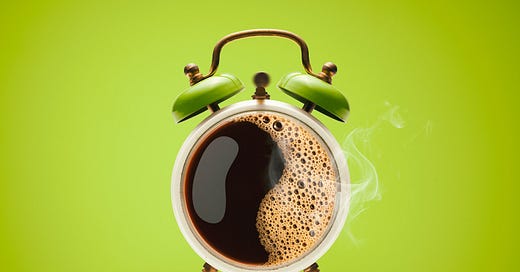The Best Time to Drink Coffee During the Day
Coffee is more than just a habit—it’s a daily ritual, a productivity enhancer, and for many, an essential part of starting the day. But have you ever stopped to wonder: when is the best time to drink coffee?
Surprisingly, the most common time people reach for coffee—right after waking up—may not actually be the most effective. Let’s explore the science of your body’s natural rhythms and identify the best times to enjoy your cup for maximum benefit.
Your Body Clock and Cortisol: The Natural Wake-Up System
Your body operates on a 24-hour cycle known as the circadian rhythm. This biological clock influences sleep, energy, hormone production, and alertness.
One of the main hormones regulated by this rhythm is cortisol, often called the “stress hormone,” but it's also responsible for keeping you alert and awake. Cortisol levels naturally peak shortly after waking—typically between 6 a.m. and 10 a.m.
During this time, your body is already wired to wake you up and keep you focused. Adding caffeine into the mix at this point doesn’t do much—and over time, it could even blunt your body’s natural cortisol response.
The Best Time to Drink Coffee: 9:30 a.m. to 11:30 a.m.
After your early morning cortisol surge drops off, caffeine becomes much more effective. Between 9:30 a.m. and 11:30 a.m., your body’s alertness from cortisol is tapering off, which makes this the ideal window to drink coffee.
In this time frame, caffeine enhances focus, alertness, and energy without interfering with your body's natural processes.
Another Good Window: Early Afternoon
Many people experience a dip in energy in the early afternoon, especially after lunch. A second coffee between 1:30 p.m. and 3:30 p.m. can give you a gentle energy lift without disrupting your nighttime sleep—provided you're not caffeine-sensitive.
However, this should be your last caffeinated beverage of the day to avoid interfering with melatonin production (the hormone responsible for sleep).
When to Avoid Coffee
Right After Waking (6:00–8:00 a.m.):
Your cortisol is already doing the job of waking you up. Let your body take the lead for the first hour. Start with a glass of water to rehydrate before adding caffeine.
Late Afternoon to Evening (After 3:00–4:00 p.m.):
Caffeine can stay in your system for six to eight hours. A cup too late in the day may lead to trouble falling asleep or lower sleep quality.
How Much Coffee Is Ideal?
Most experts recommend no more than 400 mg of caffeine per day—roughly the equivalent of four small cups of coffee. For most people, one to two cups spaced throughout the day is both effective and safe.
First cup: Between 9:30 and 11:00 a.m.
Optional second cup: Between 1:30 and 2:30 p.m.
Tips for Smarter Coffee Consumption
Hydrate first: Drink water before your coffee to avoid dehydration.
Eat something: Drinking coffee on an empty stomach can lead to acidity or jitters.
Know your body: If you’re caffeine-sensitive, limit your intake or avoid afternoon cups altogether.
Avoid sugary coffee drinks: For sustained energy, keep your coffee clean—avoid excess sugar and syrups.
Conclusion: It’s Not Just About Coffee—It’s About Timing
To get the most out of your coffee, align it with your body’s natural rhythm. Instead of reaching for the cup immediately after waking up, wait an hour or two. Mid-morning and early afternoon are the most effective times for caffeine to truly energize you—without diminishing its long-term benefits or disturbing your sleep.
Drinking coffee at the right time can boost productivity, mood, and overall well-being. So next time you pour a cup, make it not just about the flavor, but about timing it right.






